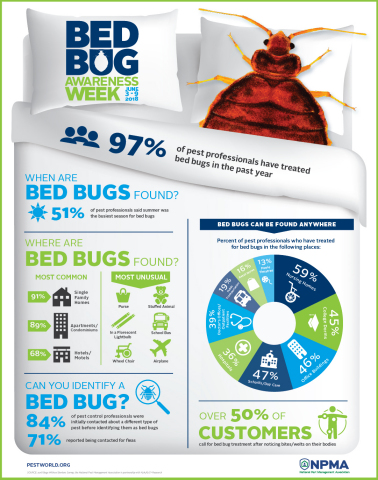Pest-Proofing Your Yard: Tips For Maintaining Outdoor Bugs At Bay
Pest-Proofing Your Yard: Tips For Maintaining Outdoor Bugs At Bay
Blog Article
Web Content Writer-Vang Espersen
Picture your yard as a haven, a location of peace and charm. However, the presence of outside pests can promptly interrupt this idyllic picture. What happens if there were straightforward yet effective means to keep these unwanted visitors at bay and safeguard your garden oasis? By following a few sensible suggestions and applying natural approaches, you can create an unified exterior room where your plants can grow uninterrupted.
Natural Bug Deterrents
To maintain bugs away from your garden normally, plant aromatic natural herbs like mint and lavender. https://www.wltx.com/article/life/animals/wildlife-rescues-inundated-with-baby-animals/101-cff9729d-5592-444e-a01e-8b4d9bce5504 add appeal to your garden yet additionally work as reliable bug deterrents. Bugs like mosquitoes, flies, and also some garden-damaging bugs are fended off by the solid scents discharged by these herbs. Merely placing them strategically around your yard can help produce a natural obstacle versus unwanted pests.
In addition to mint and lavender, consider growing other natural herbs like rosemary, basil, and lemongrass to further enhance your yard's pest-proofing abilities. These natural herbs not only work as natural repellents yet likewise have the added advantage of serving in food preparation or crafting homemade solutions.
Strategic Plant Placement
Consider the layout of your yard and the types of plants you have to tactically place them for maximum pest-proofing effectiveness.
Start by grouping plants with comparable resistance to bugs together. By doing this, you can develop a natural barrier that prevents pests from spreading throughout your yard.
In addition, putting pest-repelling plants like marigolds, lavender, or mint near more at risk plants can assist secure them. High plants, such as sunflowers or corn, can function as a shield for much shorter plants against bugs like bunnies or ground-dwelling bugs.
Keep in mind to leave enough space in between plants to enhance air blood circulation and decrease the threat of diseases that pests could carry.
Furthermore, take into consideration growing strong-smelling natural herbs like rosemary or basil near prone plants to puzzle bugs' detects and make it harder for them to situate their targets.
Effective Insect Control Methods
For combating yard pests efficiently, implementing a multi-faceted insect control method is vital. Start by motivating natural predators like birds, ladybugs, and hoping mantises to aid keep parasite populations in check. Introducing https://elliotavnha.blogoscience.com/38174499/prowling-within-your-home-are-concealed-health-dangers-postured-by-family-insects-uncover-the-shocking-risks-that-might-be-right-under-your-nose that attract these beneficial bugs can aid in parasite control. Furthermore, practicing great garden health by getting rid of debris and weeds where bugs may conceal can make your yard less hospitable to unwanted site visitors.
Think about using physical obstacles such as row cover textiles or netting to safeguard prone plants from insects like caterpillars and birds. Applying natural pesticides like neem oil or insecticidal soap can also be effective versus specific parasites while being much less damaging to helpful bugs and the setting. It's crucial to turn your crops each season to prevent the accumulation of insect populations that target certain plants.
Frequently examine your plants for indicators of insect damages so you can do something about it without delay. By incorporating these techniques and staying watchful, you can successfully manage yard insects and enjoy a flourishing, pest-free yard.
Final thought
So, there you have it - with the best methods, you can keep pesky exterior bugs far from your garden and assist your plants flourish.
Did you understand that planting mint has been shown to drive away insects and various other bugs, decreasing the demand for damaging pesticides by approximately 60%?
By incorporating natural deterrents and clever planting strategies, you can create a beautiful and pest-resistant yard oasis for you to enjoy.
